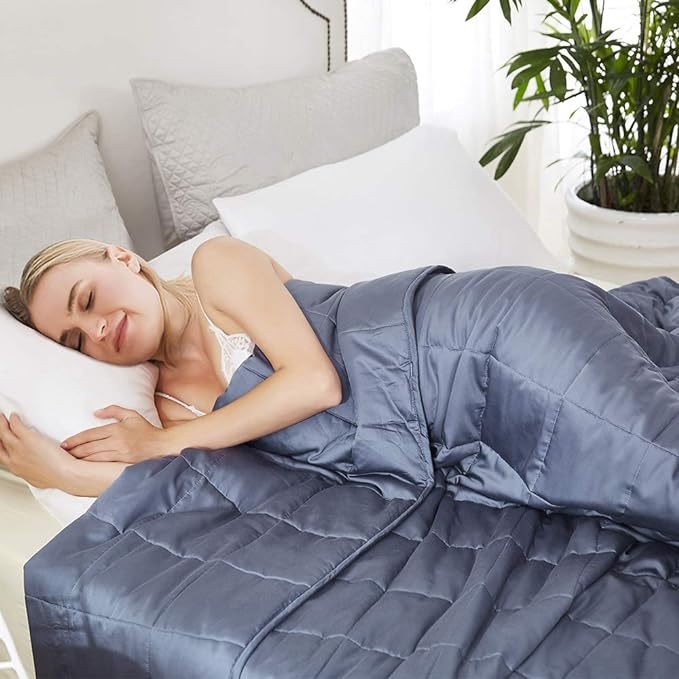In a world that seems to spin faster each day, finding moments of respite is a priority that often feels like a luxury. Weighted blankets have emerged as a simple, yet profound, tool for managing the relentless stress and the palpable anxieties of modern life. They are more than just a cozy bed companion; they provide a bridge to a state of calm that eludes many. But how do they work, and what makes them so effective? In this comprehensive exploration, we’ll uncover the deep-rooted psychological and physiological impact that weighted blankets can have on our well-being.
Introduction
Weighted blankets, once a niche product known for their role in occupational therapy, have now gained widespread recognition for their potential to soothe nerves and enhance sleep quality. As we unpack their benefits, it becomes evident that their rise to popularity is not merely a trend but a response to society’s collective need for comfort amid stress and anxiety.
Understanding Stress and Anxiety
Before we can appreciate the effect of weighted blankets, it’s vital to understand the gravity of the issues they address. Stress and anxiety are not transient emotions; they are complex conditions that impact both mental and physical health. They can lead to insomnia, heart disease, depression, and a host of other maladies. Acknowledging their pervasive influence on our well-being shines a light on the necessity for effective coping mechanisms.
Psychological Effects of Weighted Blankets
Calming Effects
Weighted blankets trigger the release of serotonin, the feel-good hormone. The added pressure simulates deep touch pressure (DTP), a sensation akin to a warm hug that signals the nervous system to calm down from a state of hyperarousal.
Improved Sleep Quality
Sleep and mood are inextricably linked. Those who struggle with anxiety often experience disrupted sleep patterns. Weighted blankets encourage the body to relax, fostering a deeper, more rejuvenating rest.
Reduction in Stress and Anxiety Symptoms
Clinical studies have shown that the use of weighted blankets results in decreased self-reported anxiety and stress levels. They provide a sense of security that, much like a pacifier to a child, soothes the mind.
Physiological Effects of Weighted Blankets
Deep Touch Pressure
The science behind DTP is deceptively simple yet profoundly effective. The light, even pressure exerted by weighted blankets triggers the production of oxytocin, the “love hormone,” which is known for its anti-stress benefits.
Regulation of the Autonomic Nervous System
The autonomic nervous system, which governs our body’s automatic processes, can be influenced by DTP. The steady pressure offered by weighted blankets promotes a parasympathetic response, which is the body’s rest-and-digest mode.
Impact on Cortisol Levels
High levels of cortisol, the stress hormone, can be a significant contributor to anxiety. Research suggests that using a weighted blanket can lead to a reduction in cortisol, serving as a natural antidote to the detrimental effects of chronic stress.
Benefits for Different Audiences
The benefits of weighted blankets extend beyond a demographic—they cater to anyone in need of tranquility. Here we look at how individuals from various walks of life can derive value from these therapeutic covers.
Adults
Adults juggle a myriad of responsibilities, and the weight of the world can often feel literal. A weighted blanket can be a grounding force, providing a brief sanctuary from life’s whirlwind.
Mental Health Enthusiasts
For those navigating the delicate ecosystem of mental health, the unyielding certainty of a weighted blanket can serve as an anchor, offering comfort when emotions are in a tempest.
Parents
Parenthood comes with its host of anxieties. Weighted blankets can provide support not only for parents but also for their children, offering a means to bond and nurture emotional well-being.
Choosing the Right Weighted Blanket
When it comes to weighted blankets, one size—or weight—does not fit all. To reap the full benefits, it’s crucial to select one that aligns with your body and needs.
Factors to Consider
Consider your body weight. A general rule of thumb is to choose a blanket that is 10-12% of your body weight. Also, think about the climate in which you live—a heavier blanket may be too much during the summer months.
Recommendations for Optimal Effectiveness
Opt for a blanket that evenly distributes the weight, with materials that are breathable and durable. Remember that the goal is to provide comfort, not to induce additional stress with an overly warm or bulky cover.
Conclusion
Weighted blankets represent a gentle yet powerful intervention for combatting stress and anxiety. Their efficacy is rooted in their ability to affect the mind and body in concert, offering a holistic approach to managing these pervasive conditions. Whether it’s the softness of the fabric, the unconscious signaling to our nervous system, or a combination of these and more, weighted blankets have found a place in the hearts and homes of countless individuals seeking solace. As we continue to uncover the significance of simple, comforting tools in our mental health toolkit, it’s clear that the weighted blanket is not a temporary fix but a lasting solution to the strains of the modern world.






